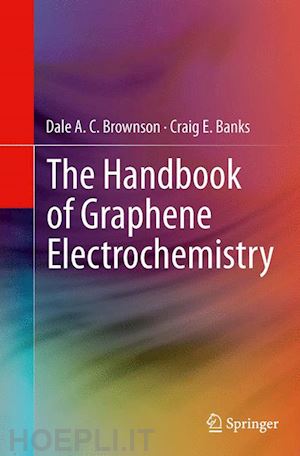
Questo prodotto usufruisce delle SPEDIZIONI GRATIS
selezionando l'opzione Corriere Veloce in fase di ordine.
Pagabile anche con Carta della cultura giovani e del merito, 18App Bonus Cultura e Carta del Docente
Graphene has grasped the attention of academia and industry world-wide due its unique structure and reported advantageous properties. This was reflected via the 2010 Nobel Prize in Physics being awarded for groundbreaking experiments regarding the two-dimensional material graphene. One particular area in which graphene has been extensively explored is electrochemistry where it is potentially the world’s thinnest electrode material. Graphene has been widely reported to perform beneficially over existing electrode materials when used within energy production or storage devices and when utilised to fabricate electrochemical sensors.
This book charts the history of graphene, depicting how it has made an impact in the field of electrochemistry and how scientists are trying to unravel its unique properties, which has, surprisingly led to its fall from grace in some areas. A fundamental introduction into Graphene Electrochemistry is given, through which readers can acquire the tools required to effectively explain and interpret the vast array of graphene literature. The readers is provided with the appropriate insights required to be able to design and implement diligent electrochemical experiments when utilising graphene as an electrode material.
Craig E. Banks is an Associate Professor / Reader in nano and electrochemical technology at The Manchester Metropolitan University, Manchester UK. Craig has published >260 papers (h = 42); also 4 books, 14 book chapters and is the inventor of 17 patent families. Craig has spun out 2 companies from his research. He was awarded the RSC Harrison–Meldola Memorial Prize (2011) for his ‘contributions to the understanding of carbon materials, in particular graphene and its application as an electrode material’. Craig is also an Associate Editor of the RSC journal “Analytical Methods” and Honorary Professor at Xiangtan (????) University. His interests lie in the pursuit of studying the fundamental understanding and applications of nano-electrochemical systems such as graphene, carbon nanotube and nanoparticle derived sensors and developing novel electrochemical sensors via screen printing and related techniques. Additionally his research peruses energy storage in the form of graphene based supercapactiors and Li and Na ion batteries.
Dale A. C. Brownson is a Research Associate in graphene engineering and graphene electrochemistry at The Manchester Metropolitan University, Manchester UK. He has published >25 papers (h = 12) and has contributed 2 book chapters. Dale received the RSC Ronald Belcher Award (2013) for ‘achievements towards the fundamental understanding of graphene as an electrode material and for contributions to the implications of this knowledge for the evolution of improved electroanalytical sensors’. Dale’s work has focused on expanding the horizons of graphene electrochemistry, which encompasses the exploration of fundamental understanding in addition to applications in sensing and energy related devices. In addition to his fundamental interests regarding fabricating and investigating 'advanced' carbon (nano)materials for beneficial implementation within electrochemical devices, his other research interestsinclude the forensic applications of chemistry.











Il sito utilizza cookie ed altri strumenti di tracciamento che raccolgono informazioni dal dispositivo dell’utente. Oltre ai cookie tecnici ed analitici aggregati, strettamente necessari per il funzionamento di questo sito web, previo consenso dell’utente possono essere installati cookie di profilazione e marketing e cookie dei social media. Cliccando su “Accetto tutti i cookie” saranno attivate tutte le categorie di cookie. Per accettare solo deterninate categorie di cookie, cliccare invece su “Impostazioni cookie”. Chiudendo il banner o continuando a navigare saranno installati solo cookie tecnici. Per maggiori dettagli, consultare la Cookie Policy.